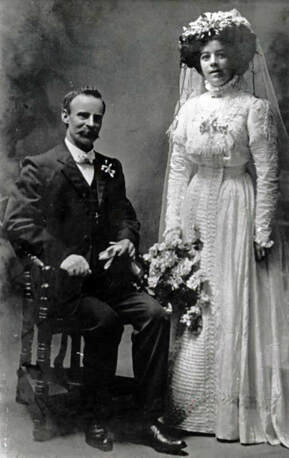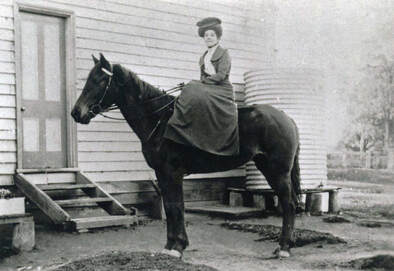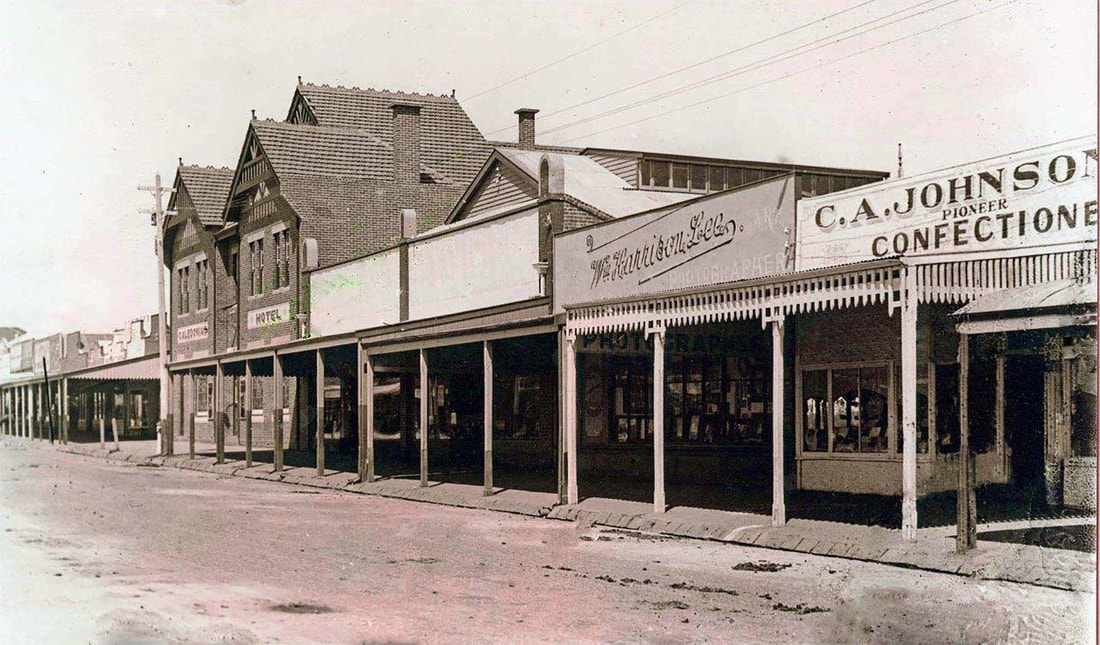 Julius Johnson and Clara Letita Ah Chow on their
Julius Johnson and Clara Letita Ah Chow on their wedding day, November 10, 1910
An astute business woman way ahead of her time, Clara Johnson opened Wonthaggi’s first hamburger shop and used wind energy to power her shops in Inverloch.
By Geoff Johnson
CLARA Letita Ah Chow married Julius Johnson at Bruthen on November 10, 1910. It must be recorded that ‘Jule’, as my dad was known, was a happy participant in all of the lifetime endeavours of Clara. They accomplished so much in a long lifetime together.
Bear with me, for what I now relate has a bearing on my parents’ lifetime of endeavours. I start with Clara’s honeymoon in 1910 at Blackwood in Central Victoria. Here, in a short time, she and her new husband, Jule, unearthed gold to the value of 600 English pounds. This was a sizeable amount of money for 1910.
By Geoff Johnson
CLARA Letita Ah Chow married Julius Johnson at Bruthen on November 10, 1910. It must be recorded that ‘Jule’, as my dad was known, was a happy participant in all of the lifetime endeavours of Clara. They accomplished so much in a long lifetime together.
Bear with me, for what I now relate has a bearing on my parents’ lifetime of endeavours. I start with Clara’s honeymoon in 1910 at Blackwood in Central Victoria. Here, in a short time, she and her new husband, Jule, unearthed gold to the value of 600 English pounds. This was a sizeable amount of money for 1910.
It enabled the newly-weds to come to Wonthaggi and purchase several blocks of real estate on the corner of Graham Street and Billson Street. Back then a person could buy a house block in Wonthaggi for £8 and build something on it for another £5.
Clara and Jule built shops and rented them out. Once established, this locality became known as Johnson’s Corner and remained Johnson’s Corner for many years to come.
The couple kept one shop for themselves to operate, living in the back and trading at the front. Clara ran a business called “The Hamburger Shop”, the first business of its kind in Wonthaggi, or possibly in Australia. An innovator, she commissioned round, flat rolls from the Co-op Bakery to use for her burgers. They were a hit.
The couple kept one shop for themselves to operate, living in the back and trading at the front. Clara ran a business called “The Hamburger Shop”, the first business of its kind in Wonthaggi, or possibly in Australia. An innovator, she commissioned round, flat rolls from the Co-op Bakery to use for her burgers. They were a hit.
I spent the first 23 years of my life living at the back of The Hamburger Shop, but that wasn’t the end of Clara’s business enterprises. It was the beginning of an incredible venture for Clara and Jule into the business and social activities in the new Borough of Wonthaggi, the seaside hamlets of Inverloch and Cape Paterson and the farmlands of Drouin.
Clara’s entrepreneurial ventures extended to Inverloch. She bought a large tract of land opposite what is now the boat ramp and car park encased by three roads north, east and west. She then bought several business blocks, now the site of the Inlet Hotel and also all close-by parcels of land available. She had a different shop constructed on each parcel and during summer holidays employed as many as 16 girls and a few men to run businesses for tourists’ convenience.
Clara showed flair for progress, actively pushing for an Inverloch water supply and electricity. When the electricity supply was delayed, she had a wind tower erected behind her premises to supply energy to batteries, which powered the shops. With the advent of the SEC (State Electricity Commission) power, Clara had a very large refrigerator installed. This proved a revelation to the customers who bought ice cream that was made on site. Soda fountains and other delights progressed into a new era for retail cafes, milk bars and lolly shops.
Clara’s entrepreneurial ventures extended to Inverloch. She bought a large tract of land opposite what is now the boat ramp and car park encased by three roads north, east and west. She then bought several business blocks, now the site of the Inlet Hotel and also all close-by parcels of land available. She had a different shop constructed on each parcel and during summer holidays employed as many as 16 girls and a few men to run businesses for tourists’ convenience.
Clara showed flair for progress, actively pushing for an Inverloch water supply and electricity. When the electricity supply was delayed, she had a wind tower erected behind her premises to supply energy to batteries, which powered the shops. With the advent of the SEC (State Electricity Commission) power, Clara had a very large refrigerator installed. This proved a revelation to the customers who bought ice cream that was made on site. Soda fountains and other delights progressed into a new era for retail cafes, milk bars and lolly shops.
 Clara Letita Johnson, 1883-1972
Clara Letita Johnson, 1883-1972 Soon Clara and Jule, along with the Fultons, were the first to select farmland at Cape Paterson. Their 540 acres was later developed by their youngest son, and that was me.
Clara and Martha Fulton took Wonthaggi Borough councillors in their 1928 Chevrolet Van on a “progress development mission” along the Track* to “The Cape”. On the way the councillors, who were dressed in their best, had to push the van out of the bogs. Surely, this convinced them to construct a real road of built-up metal to The Cape**.
Regardless of road problems, Clara, along with Jule’s sister, Alma Mackieson, established the shop at Cape down near the beach. Their respective hubbies built the impressive footbridge over what was then a creek near the shop entrance. The bridge provided the final link to the sand dunes and beach.
In the difficult depression years of the early 1930s, Clara and Alma became part of the Welfare Committee who gave assistance to so many in need. These two women prevailed on local traders who willingly donated materials such as roofing iron, a black coal-burning stove, a galvanised fireplace and more. The two girls even set to and constructed a galvanised iron shed to take the place of a tent situation that housed a rather poor large family. This abode was located in scrubland, which is now the Wonthaggi Football Ground. The details of this remarkable achievement are so heart-warming and typical of many stories of these hard times of the depression years.
At the start of the Second World War, Clara’s and Jule’s three eldest sons join the services. Along with all residents left at home, Clara was active in serving her community on welfare and support committees and did whatever she could to help. Many warm friendships were developed during this time. Clara took over the café owned by her eldest son, Mel, when he was in Malaya – Changi and Burma –to keep it open for his return. On his return, Mel built the Astor Café on the site now occupied by the Miners’ Dispensary.
Clara always had an eye out for yet another enterprise to invest in, and her entrepreneurship and vigorous pursuits had a huge influence on her children’s lives. During the Second World War, she and Jule bought a dairy farm at Drouin South, which was then farmed by their daughter, Doris, and son-in- law, Ken McMaster.
Clara and Jule were foundation members of the Wonthaggi Baptist Church. Their seven children all had their early education in Wonthaggi schools. When they grew up, they established extensive business activities in and around Wonthaggi.
Clara’s business acumen, advice and guidance were keenly sought and gratefully put into action. She was an exceptional role model to her family and an outstanding citizen to her community with strong desire to help and show concern towards others.
Her final years were spent at 186 Graham Street, in one of the early brick houses built by her sons. She died on September 24, 1972 at the age of 89 years. Her husband, Jules, died on June 11, 1966. He was 90 years old. Both were laid to rest at the Wonthaggi Cemetery.
Geoff Johnson is the youngest of Clara’s seven children.
This essay was first published in The Plod, the newsletter of the Wonthaggi Historical Society.
Clara and Martha Fulton took Wonthaggi Borough councillors in their 1928 Chevrolet Van on a “progress development mission” along the Track* to “The Cape”. On the way the councillors, who were dressed in their best, had to push the van out of the bogs. Surely, this convinced them to construct a real road of built-up metal to The Cape**.
Regardless of road problems, Clara, along with Jule’s sister, Alma Mackieson, established the shop at Cape down near the beach. Their respective hubbies built the impressive footbridge over what was then a creek near the shop entrance. The bridge provided the final link to the sand dunes and beach.
In the difficult depression years of the early 1930s, Clara and Alma became part of the Welfare Committee who gave assistance to so many in need. These two women prevailed on local traders who willingly donated materials such as roofing iron, a black coal-burning stove, a galvanised fireplace and more. The two girls even set to and constructed a galvanised iron shed to take the place of a tent situation that housed a rather poor large family. This abode was located in scrubland, which is now the Wonthaggi Football Ground. The details of this remarkable achievement are so heart-warming and typical of many stories of these hard times of the depression years.
At the start of the Second World War, Clara’s and Jule’s three eldest sons join the services. Along with all residents left at home, Clara was active in serving her community on welfare and support committees and did whatever she could to help. Many warm friendships were developed during this time. Clara took over the café owned by her eldest son, Mel, when he was in Malaya – Changi and Burma –to keep it open for his return. On his return, Mel built the Astor Café on the site now occupied by the Miners’ Dispensary.
Clara always had an eye out for yet another enterprise to invest in, and her entrepreneurship and vigorous pursuits had a huge influence on her children’s lives. During the Second World War, she and Jule bought a dairy farm at Drouin South, which was then farmed by their daughter, Doris, and son-in- law, Ken McMaster.
Clara and Jule were foundation members of the Wonthaggi Baptist Church. Their seven children all had their early education in Wonthaggi schools. When they grew up, they established extensive business activities in and around Wonthaggi.
Clara’s business acumen, advice and guidance were keenly sought and gratefully put into action. She was an exceptional role model to her family and an outstanding citizen to her community with strong desire to help and show concern towards others.
Her final years were spent at 186 Graham Street, in one of the early brick houses built by her sons. She died on September 24, 1972 at the age of 89 years. Her husband, Jules, died on June 11, 1966. He was 90 years old. Both were laid to rest at the Wonthaggi Cemetery.
Geoff Johnson is the youngest of Clara’s seven children.
This essay was first published in The Plod, the newsletter of the Wonthaggi Historical Society.
